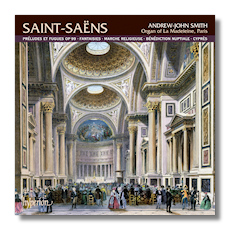
The Internet's Premier Classical Music Source
Related Links
- Saint-Saëns Reviews
- Latest Reviews
- More Reviews
-
By Composer
-
Collections
DVD & Blu-ray
Books
Concert Reviews
Articles/Interviews
Software
Audio
Search Amazon
Recommended Links
Site News
 CD Review
CD Review
Camille Saint-Saëns

Organ Works
- 3 Preludes and Fugues, Op. 99 #1-3
- Fantasie #3 in D Flat Major, Op. 101
- Fantasie in E Flat Major, Op. 157
- Bénédiction nuptiale, Op. 9
- Cyprès et Lauriers, Op. 156 #1
- Marche religeuse, Op. 107
Andrew John Smith
Organ de la Madeleine, Paris
Hyperion CDA67713 78m DDD
Misunderstood during his lifetime and grossly neglected after his death, Camille Saint-Saëns' work (apart from a handful of "all-time hits") remains largely to be discovered. He wrote a huge amount of compositions in every genre, but for various reasons, many totally unmusical and unjust, he was always sidelined, and the time is more than ripe for a serious re-appraisal.
This glorious disc should go a long way towards re-establishing his organ "ouevre". The earliest pieces are the "Fantasie in E flat" (1857) and the "Bénédiction Nuptiale" Op. 9. The former was Saint-Saëns first published organ work and its exceptional technical demands are impressive indeed. The latter is a beautiful example of that merging of melody and harmony so espoused by the composer.
The 3 Preludes and Fugues, Op. 99 date from 1894 and were Saint Saëns' first significant organ contributions for nearly 30 years. Stylish and virtuosic, they made a big impression on Vierne who commented that the Op. 99 should be in every organist's repertoire. The 1897 "Marche religieuse" is an exuberant, elegant and powerful creation, and is the last work from his period of renewed activity in the 1890's.
The Fantasie #3 and "Cyprès et Lauriers" were written two years before his death, and both encapsulate a certain strain of grief and resignation. Andrew-John Smith gives incomparable performances full of zest, power and technical acumen, and his monumental essay is as versatile as his playing. This is a truly invaluable advocacy for the Saint-Saëns cause.
Copyright © 2008 by Gerald Fenech




















